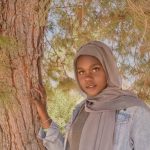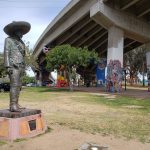[hoot_slider id=”1466″]
Reflection:
Established in 2017, the Refugee Health Unit is a functionary of the UC San Diego Center for Community Health and is funded through the UC San Diego Health System. Located in the ethnically diverse City Heights neighborhood, the Unit works in collaboration with local San Diego organizations to help the needs of refugees by providing resources necessary for a large number of organizations to ease existing health disparities. In particular, the Refugee Health Unit addresses public health issues in a holistic manner, with an emphasis on mental and physical health. For our project with the Refugee Health Unit, we created a series of community profiles that highlight the work, stories, and experiences of community leaders from a variety of partner organizations that work with the Unit. The profiles were based around six different interviews, three interviews conducted by Paul Holbel and three conducted by Avika Dhillon.
We primarily worked with Reem Zubaidi, the Health Policy and Communications Coordinator at the UC San Diego Center for Community Health, and Amina Sheikh Mohamed, the Director of Community Mobilization Programs at the UC San Diego Center for Community Health. They are also two principal members of the Refugee Health Unit, and after consulting with them we developed a two-part approach to our assignment. There would be a primary digital component as well as an interactive poster-board that would be presented on June 7th at the group project showcase. Zubaidi indicated that the Refugee Health Unit is looking to extend their online presence and accessibility regarding to local communities, so after interviewing community leaders we would create an infographic for each person that could be shared on social media or printed on flyers. The graphic would explain the individual’s role in the partner organization, what they looked like, the main quote highlighting the image, and three questions and answers from the interview.
Our next step was to establish contact with all of the different organizations. Based on a spreadsheet that Reem Zubaidi shared with us, each of us chose three affiliated organizations to reach out to, so we could figure out which ones we would use for the profiles. We were looking for individuals who represented the interests of different refugee communities in City Heights, San Diego, and that were available and willing to be interviewed. After working our way through the list, we ended up with six different individuals who agreed to be interviewed.
The community leaders interviewed by Paul Holbel included Noun Abdelaziz, a member of the Youth Advisory Council who has spoken on conference panels about racism and health disparities that affect youth in City Heights. Next, there was Mark Tran, Program Associate at the California Endowment, who studies of the social determinants of health and leads the development of health-related projects, safe parks/open spaces for kids to walk, positive and healthy relationships with law enforcement. The third profile is of Nao Kabashima, the Executive Director of the Karen Organization who helped start the Karen Organization back in 2009 with associates from Burma.
The community leaders interviewed by Avika Dhillon were Ramla Sahid, Nora Abunadi, and Dilkhwaz Ahmed and represented a substantive range of the City Heights community. Ramla Sahid is the Executive Director of the Partnership for New Americans, or PANA, and works with refugees to confront concerns of recently resettled refugees. Next, Nora Abunadi is a first-generation Palestinian and the Youth Organizer for the Majdal Center and emphasizes youth empowerment in the refugee community through active engagement and English-language learning. Finally, the last interview was with Dilkhwaz Ahmed, the Executive Director of License to Freedom, and she has spent the last twenty years helping refugee families adjust to life in the United States, with a particular emphasis on women’s advocacy and advancement.
To make the graphic, we used an online software called Canva, to create the individual graphics for each profile. After creating our own template, we checked in regularly with Zubaidi and Mohamed throughout the design process in order to ensure that the color scheme reflected the new branding of the Refugee Health Unit. Each profile had two sections, with the first half showing a picture of the interviewee, their affiliated organization, their position and a short, inspirational quote from our interview with them. We then choose three questions and responses from our interviews and applied them to the second half of each profile, creating a snapshot of each community leader.
In addition, for our presentation on June 7th, we decided to demonstrate the relationship between each profile and the organization they represented. With the assistance of the Refugee Health Unit, we printed each profile onto an individual poster-board. Then, we took a map of the City Heights neighborhood and surrounding areas, and marked the location of all the organizations we made contact with. Using different colored strings, we connected the profiles with their organizations on the map in order to show their connection with the community that they serve. In addition to the profiles, we also used three of our interview questions to make ‘interactive’ posters, where guests attending the showcase would be able to participate by creating a community profile as a communal act.
Ultimately, this process of contacting, interviewing, and compiling data not only helped us examine the history of racial and ethnic communities in San Diego but allowed us to build relationships with a community partner and engage with refugee-based organizations throughout the City Heights area. Neither of us had ever conducted interviews on this scale, nor did we have any substantial design experience. However, thanks to the careful guidance of both Reem Zubaidi and Amina Sheikh Mohamed, as well as the insightful commentary of the individuals that we interviewed, we were able to contribute to the collection and preservation of community activism in San Diego. These profiles will be published online to celebrate World Refugee Day and will represent another step on behalf of the Refugee Health Unit to advance engagement across all communities in the City Heights neighborhood.




